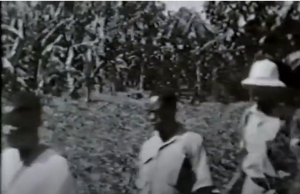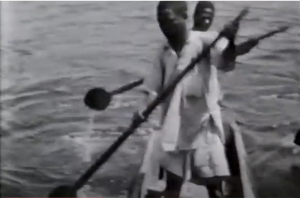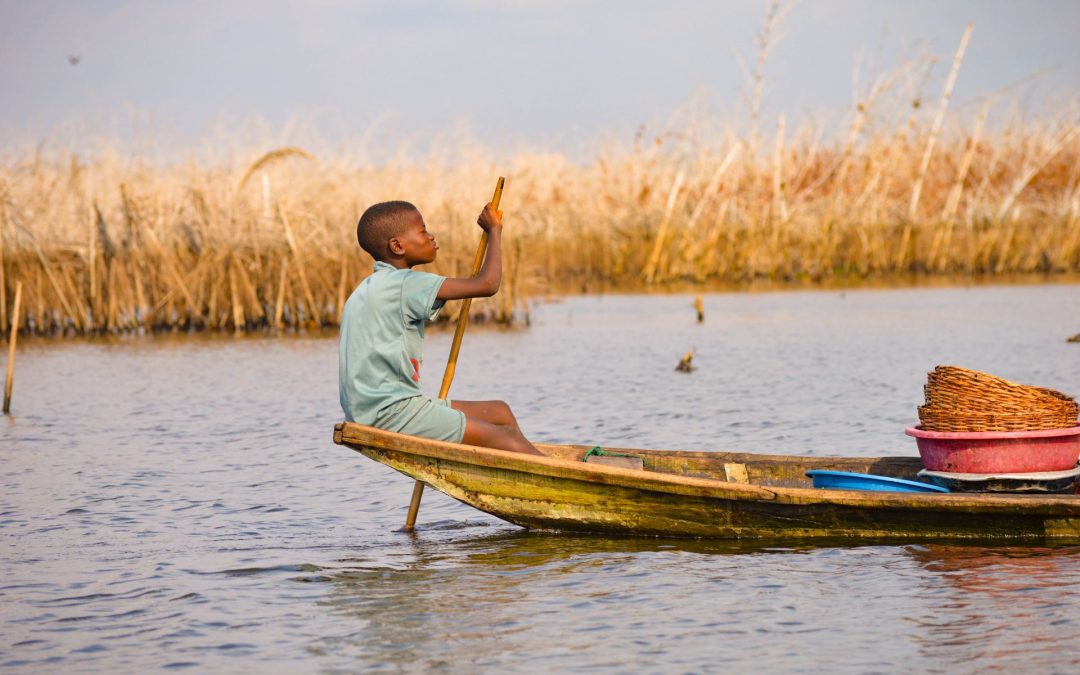Ayotunde Ojo’s research, based at the University of Manchester, seeks to explore the significance of local capacity in achieving health goals through a historical study of international collaborative efforts between the World Health Organisation (WHO) and indigenous actors in Nigeria in responding to health challenges. In this blog post she reflects on a film introduced to us during our first workshop, Roads to Africa (1936), as a way to reflect on representing African agency.
The Black Health and the Humanities network’s first workshop deepened my interest in studying black perspectives on the history of health and biomedical interventions in Africa. The talks delivered by Dr Chisomo Kalinga, Africa and the Health Humanities: Theory, Method and Practice, and Dr Lioba Hirsch, Working in Colonial Ruins: Antiblack Racism and Global Health, were enlightening. Their talks reinforced the restoration of black agency so far underexplored in colonial archives. Lioba revealed that in most European archives, blackness and Africanness can only be assessed through the perspectives of white European men. For example, the histories preserved at the LSHTM collections are predominantly the stories of the white, male, colonial explorers, researchers and medical professionals who worked in the former British colonies. These collections consist of the contributions that these individuals made to tropical medicine and science. The voices that dominate the archives display the racial and national hierarchies that characterized early health intervention. These colonial legacies have worked their way into global health programmes and research, and are evident in. There are recent reports of white supremacy in high-profile global health organisations (Guinto 2019).
Sabelo J. Ndlovu-Gatsheni, an African historian and decolonial theorist, defines coloniality as ‘the longstanding patterns of power that emerged from colonialism and continue to define culture, labour, intersubjective relations and knowledge production, long after the end of direct colonialism. It is that continuing dominating phenomenon that survived colonialism’ (Ndlovu-Gatsheni 2013). These colonial legacies have continued to inform contemporary discourse on research in the history of global health in Africa, as well as permeate the production of knowledge about the continent of Africa, its peoples, and societies (Crawford, Mai-Bornu and Landström 2021). In some existing historical studies of global health in Africa, the roles played by African actors have often been assessed through non-African writers from North America and Europe. These historical narratives have overemphasised the impact and achievements of Western international actors and the roles played by ordinary African individuals are underestimated. For example, in Eurocentric accounts of the history of malaria control and eradication in Africa, the role and experience of North American and British scientists in colonial antimalaria projects attracted attention. Sometimes they were lauded for the advancement of the malaria projects, whereas input from African communities was interpreted as little or none (Packard 2007, Stepan 2011). Some North American health historians have described the response of Africans to malaria control as uncooperative, unmotivated and displaying a resistance to the execution of health programmes. African actors are also examined as beneficiaries of health projects and not seen as active actors or partners (Webb 2014, Graboyes 2014). This has led to a narrow understanding of the capacity of various African actors and undermines the value added by these actors in health interventions. The lack of attention paid to the contributions and voices of local African actors has prevented us from fully understanding the nature of health programmes. As a result, these studies present a singular view of history.
There are methodological gaps in the historical literature of global health in Africa reviewed above which I attribute to the vestiges of colonialism in the academy and research methodologies. Their evidence is drawn only from archives based in Europe and the US. Their assessment of African actors was based on their findings from the reports of North American and European scientists who visited some countries in sub-Saharan Africa. These studies do not sufficiently consult local sources as part of their historical methods and their work was not informed by material from African-based archives. Moreover, some North American health historians who undertook research in archives located in Africa only focus on British voices. The experiences and contributions of the indigenous African people are often noticeably absent from their studies. Consequently, a one-sided view of history of global health in Africa is produced.
African perspectives continue to be marginalized or excluded in research (Falola, 2022). Some African scholars have advocated for rethinking the way knowledge about Africa is obtained and produced. Kwesi Yankah, a Ghanaian academic, has criticised the Western-centric approach, arguing that, Western academics frequently produce poor standard and inadequate knowledge about Africa and emphasized the need for the analysis of ground material from Africa (Yankah 1995). In order to address the marginality of Africa in the knowledge domain, Ndlovu-Gatsheni offers a case for centering Africa as ‘a legitimate historical unit of analysis and epistemic site from which to interpret the world’ (Ndlovu-Gatsheni 2018).
My PhD research contributes to decolonising global health by writing a different historical narrative that foregrounds African agency in international health collaboration. My research explores the capacity of indigenous African actors in executing health programmes through the historical study of international collaborative efforts between the officials of the World Health Organisation (WHO) and Nigerian actors. My research adopts a decolonial approach to provide a different perspective to evaluate the role of African actors in international and global health activities by presenting Africa as an active actor and historical agent. My research incorporates sources from African-based archives to uncover and retrieve silenced and marginalised knowledges of African actors in international health history (Keikelame & Swartz 2019). My study adopts Jelmer Kamstra’s description of individual capacities as ‘competencies such as experience, knowledge, technical skills, energy, motivation and influence’ (Kamstra, 2017). The capacity of indigenous African actors can be described as the contributions made by Africans via their competencies to carry out international health programmes in Nigeria. This will investigate how the skills, knowledge and experience of the indigenous African actors enabled the delivery of health programmes. The multi-faceted actors in the delivery of health programmes examined are individual elites, monarchs, village heads, grassroot organisations and religious bodies.
I will be employing materials from different kinds of archives located in Nigeria and other African countries, and the collections based in European and North American archives, as my main empirical evidence. I will be making a comparative analysis of the perspectives of white European men about Africans and the stories of the lived realities and existential experiences of colonised African people, which is likely to provide answers to the role of African agency that has been understudied and underanalyzed. I consider archival research that combines multiple archival sources from different geographical locations to yield more convincing evidence. Much of my current work is concerned with amplifying the voices and perceptions of marginalised African people and communities within the context of international health. In the history of international and global health in Africa, an in depth understanding as well as the genuine acknowledgement and acceptance of the contribution of the indigenous people of Africa is necessary for a complete and balanced account. After carrying out detailed research in the archives in Nigeria, I discovered that rich and immense knowledge has been lost in most of the Eurocentric accounts due to not incorporating information about, and the voices of, indigenous Africans, using evidence from Africa-based archives. Besides the knowledge acquired from archives from Europe and North America, embracing locally relevant research and knowledge about African people is very useful. I am able to provide a different version of history to the dominant Western-centric studies reviewed earlier.
The movie Roads to Africa (1936) is from the London School of Hygiene and Tropical Medicine’s archive which Lioba Hirsch shared with us during the workshop. We were prompted to imagine the positionality of Blackness which we encounter in the archive. David Gillett, a British Professor of Tropical Medicine, did the narration throughout the movie which was about a 10-month expedition in 1936 embarked by Gillett and Major H S Leeson, a Liverpudlian entomologist, to investigate the mosquito species and in different places in East Africa.

A still taken from the film showing three Ugandan local assistants hired by Leeson and Gillet, walking along a route of banana plants in search for malaria transmitter. Image shot courtesy of LSHTM Archives, UK.
Roads to Africa serves as an eye opener. For me, the film shows why we should care about the absence of local actors in existing historical accounts of colonial expeditions. There are various scenes that feature Leeson and Gillett engaging with a range of Africans actors, which I interpret as the indigenous actors having agency because they did not remain passive. According to Ronald Chipaike, an African scholar of international relations, African agency should be seen as emanating from and being exerted by exceptional and ordinary African individuals (Chipaike and Knowledge 2018). To draw out the indigenous African agency in the film, there are two questions worth exploring: how did these researchers adapt to the local environments they encountered during the expedition? What made it possible for indigenous African actors to be influential in their encounters with the British scientists?
I argue that Road to Africa offers some insight into the capacity of ordinary African individuals who were active collaborators, but what is largely missing in the film is how the abilities, skills, and competencies of the various African people contributed to the progress of the expedition embarked by the British entomologists. Take for example, the scene that showed the British entomologist using a stick to catch a sixteen-foot python. There were cobras in the jungle filled with outcrops inhabited by plenty of mosquitoes, which was of great interest to the British entomologists. In his narration, Gillet acknowledged that they were shown how to catch a deadly poisonous cobra by a Ugandan man who was an expert at taming snakes. However, there was no footage to show the expertise of the Ugandan animal tamer in sharing his knowledge of animal taming with the British entomologists in the movie. Due to the input of locals, they were able to navigate the challenge of confronting dangerous animals during their research to ensure their safety. This can be viewed as a significant contribution to our understanding of the role of African actors as active collaborators by making it possible for the British entomologists to adapt to local environments. In addition, the movie excludes the voices and perceptions of a range of short and long term local research assistants and other support staff in Uganda and Tanzania that featured in the background of the movie. One example is the local boat paddlers. Gillett mentions in his narration that they employed these local assistants while researching mosquitoes in different locations. Most of the recording captures the drive and enthusiasm that the British entomologists demonstrated in their research. As a researcher interested in the relevance of African agency, complexity and nuance can be lost. I conclude that Roads to Africa represents only a slice of reality, and it appears to me that much of what they recorded was the story of researchers in a white British colonial order.

A still taken from the film showing the Ugandan boys paddling Leeson and Gillet across the river filled with plenty of papyrus in Uganda Image shot from the movie. Courtesy of LSHTM Archives, UK.
References
Chipaike, Ronald and Knowledge, Matarutse. 2018. “The question of African agency in international relations” Cogent Social Sciences, 4(1):1-16.
Crawford, Gordon, Mai-Bornu, Zainab and Landström, Karl. 2021. Decolonising knowledge production on Africa: why it’s still necessary and what can be done, Journal of the British Academy, 9(1): 21–46.
Falola, Toyin. 2022. Decolonizing African studies: knowledge production, agency, and voice, Rochester: University of Rochester Press.
Graboyes, Melissa. 2014. “The Malaria Imbroglio”: Ethics, Eradication, and Endings in Pare Taveta, East Africa, 1959–1960” The International Journal of African Historical Studies, 47(3): 445-471.
Guinto, Renzo. 2019. “Decolonize Global Health: Rewriting the narrative of global health” International Health Policies https://www.internationalhealthpolicies.org/blogs/decolonizeglobalhealth-rewriting-the-narrative-of-global-health/ (accessed 25/07/2022).
Kamstra, Jelmer. 2017. Dialogue and dissent theory of change 2.0: supporting civil society’s political role. The Hague: Ministry of Foreign Affairs of the Netherlands
Keikelame, Mpoe and Swartz, Leslie.2019. “Decolonising research methodologies: lessons from a qualitative research project, Cape Town, South Africa” Global Health Action, 12(1) [online] Available at: https://www.tandfonline.com/doi/full/10.1080/16549716.2018.1561175 (accessed 01/08/2022).
Ndlovu-Gatsheni, Sabelo. 2013. Coloniality of Power in Postcolonial Africa: Myths of Decolonization. Oxford, African Books Collective.
Ndlovu-Gatsheni, Sabelo. 2018. Epistemic Freedom in Africa: Deprovincialization and Decolonization. Abingdon, Routledge.
Packard, Randall. 2007. The Making of a Tropical Disease: A Short History of Malaria. Baltimore: Johns Hopkins University Press, pp.150-176.
Stepan, Nancy. 2011. Eradication Ridding the World of Diseases Forever. London: Reaktion Books.
Webb, James. 2014. The Long Struggle against Malaria in Tropical Africa, New York: Cambridge University Press.
Yankah, Kwesi. 1995. “Displaced Academies and the Quest for a New World Academic Order” Africa Today, 42(3): 7–25.

